新编大学英语教案book1-unit1
Unit 1 Love新编大学英语第二版第二册教案
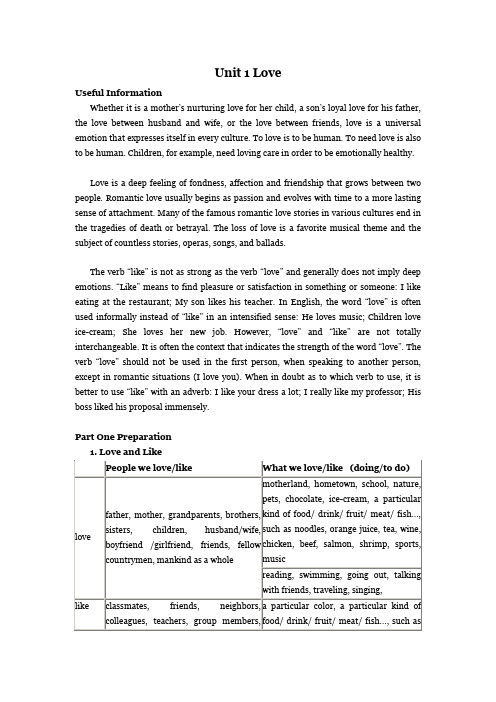
Unit 1 LoveUseful InformationWhether it is a mother’s nurturing love for her child, a son’s loyal love for his father, the love between husband and wife, or the love between friends, love is a universal emotion that expresses itself in every culture. To love is to be human. To need love is also to be human. Children, for example, need loving care in order to be emotionally healthy.Love is a deep feeling of fondness, affection and friendship that grows between two people. Romantic love usually begins as passion and evolves with time to a more lasting sense of attachment. Many of the famous romantic love stories in various cultures end in the tragedies of death or betrayal. The loss of love is a favorite musical theme and the subject of countless stories, operas, songs, and ballads.The verb “like” is not as strong as the verb “love” and generally does not imply deep emotions. “Like” means to find pleasure or satisfaction in something or someone: I like eating at the restaurant; My son likes his teacher. In English, the word “love” is often used informally instead of “like” in an intensified sense: He loves music; Children love ice-cream; She loves her new job. However, “love” and “like” are not totally interchangeable. It is often the context that indica tes the strength of the word “love”. The verb “love” should not be used in the first person, when speaking to another person, except in romantic situations (I love you). When in doubt as to which verb to use, it is better to use “like” with an adverb: I li ke your dress a lot; I really like my professor; His boss liked his proposal immensely.Part One Preparation2. Can You Tell the Difference?Sample 1It’s true that motherly love is unconditional. I believe what I’ve got from my mother is the deepest love I’ve ever received. When I was at home, mother took good care of me and did what she could to meet my needs. For example, she remembered all my birthdays and bought nice birthday gifts for me, but she never celebrated hers. At home she woke me up in the morning after she had prepared breakfast. Sometimes she even combed my hair while I was having breakfast so that I could get to school on time. She treated my classmates kindly when they were with me. I know that’s because they were my good friends. Now I’m away from home, she calls me every two or three days asking about my college life and what she can do for me. It seems that my life is much more important than hers.As for fa therly love, I’m not sure if his love is conditional, but obviously it’s different from mother’s love. Father also loves me very much. He pays more attention to my education and what I’m going to be in future. He doesn’t care much about my daily life, but asks me to keep him informed of my study and progress. During my last year in high school, he was unusually patient with me. He encouraged me when I wasn’t doing well at school and helped me when I had difficulties. Father must have been a math wizard in his school days. He seemed to know all the solutions to my math problems and could point out my weaknesses. Following his instructions, I began to feel interested in math myself.Sample 2I think there’s something in his statements, although it’s hard for m e to identify whose love is fatherly and whose love is motherly in the case of my parents. Unlike most mothers in the world, my mother has been very strict with me. Maybe she thinks a boy should develop a strong, tough and persistent personality to be able to get around in this competitive world. She pays a lot of attention to my study and has been concerned with my progress. Although she didn’t receive higher education herself, she believes it is essential to me and hopes I can continue my study after I finish the undergraduateprogram. When I didn’t do well in school, mother would ask me to reflect on my failure and see how I could do better the next time. Mother would be very angry if I argued for my problem or covered any of my wrong doings. Several times when I was in my junior high school, I doubted that I was her biological son.On the other hand, my father has been very kind to me. He knows my needs and does his best to satisfy them. When mother criticized me, father would comfort me afterwards. When father had something good, he would ask me if I needed it. I still remember father bought me a lot of toys in my childhood, such as toy vehicles and robots. And he bought me a lot of books during my school years. Father even made a few of his business trips during my vacations so that he could take me with him to see the places. Now father always looks forward to my going back home before holidays. Each time he would offer me the nice things he has bought or received since I last saw him and feel very happy if I take any of them. I also enjoy his company very much, feeling secure and relaxed. That’s why I often think I have the best father in the world.3. Someone You Love MostSample 1I love my mother most, because she’s always very kind to me, unlike my father who will scold me or slap me if I make mistakes or if I am naughty. My mother is an ordinary-looking woman, but in my eyes she is very beautiful. She is very hard-working, and does almost all the housework. When I was working for the entrance examination, she was very thoughtful and never let me do any housework. When I didn’t do a good job in school, she would encourage me and hope I would do better next time. When I was hungry at night, she would fix a snack for me. She is a good cook, now it’s a pity that I am not able to have what she cooks because I am far away from home.Sample 2I spent my childhood with my grandfather because my parents were too busy to take care of me at that time. Now I often visit him, especially in holidays. He’s a very kind and knowledgeable person. He reads a lot and knows so much about the history of our country. Before I could read, he told me many interesting stories: stories about Monkey King, heroes in The Three Kingdoms and Water Margins, etc. When I was in the e lementary school, he began to buy books for me and that’s why reading is always my hobby.I believe I owe a great deal to my grandfather for my growth, physical and intellectual. He’s been taking good care of me and I often feel I’m lucky to have such a ki nd, thoughtful, intelligent and generous grandfather.Part Two Reading-Centered ActivitiesIn-Class ReadingI.Pre-Reading1. I feel pity towards those who are disabled. I wonder how they can manage in their daily life and whether they have a job. I feel lucky that I’m not disabled.2. Yes. My aunt is deaf and dumb. She has been like this since her childhood. My grandmother said that she became deaf because of taking the wrong medicine. She is now more than seventy years old and she has never been married. She was very kind to me. In fact it was she who brought me up. She often felt it was unfair because she couldn’t hear. But she is very intelligent, and she is good at sewing. She sometimes kidded me with gestures that she wanted to cut off her ears becaus e they didn’t work.II. Passage ReadingNotes:1. There are five districts in N.Y. They are also called five boroughs. They are: Manhattan, Brooklyn, the Bronx, Queens, and Staten Island. Central Park and Harlem are both located in Manhattan. Brooklyn is located just across the river from Manhattan.2. The subway station uses tokens and they cost about 50 cents each.3. Baseball is an outdoor game between two teams of nine players, in which players try to get points by hitting a ball and running around four bases. It is one of the most popular games in the United States.Words, Phrases and Grammatical Points1. …I was embarrassed to be seen with my father(l.1)This can be paraphrased as “I was embarrassed when the others saw me together with my father”.2. despite (l.9)e.g. Despite all our efforts to save the school, the County decided to close it.She went to Spain despite the fact that the doctor had told her to rest.同义词组:in spite ofe.g. We went out in spite of the rain.Kelly loved her husband in spite of the fact that he drank too much.3. ice-free 类似的词有:a salt-free diet, a trouble-free journey, duty-free, rent-free 等(l.14)4. …nor did he show any envy of the more fortunate or able. (l.20)这是一句用“nor”引导的倒装句。
新编大学英语1教案

教学目标:1. 通过本单元的学习,使学生掌握相关词汇和语法知识,提高英语听说读写能力。
2. 培养学生运用英语进行交流的能力,增强学生的跨文化交际意识。
3. 帮助学生了解并关注社会热点话题,提高学生的思辨能力。
教学内容:1. 词汇:本单元重点词汇包括:environmental protection、energy-saving、public transportation等。
2. 语法:现在进行时态的构成和用法。
3. 听力:听懂日常生活中的对话,了解不同文化背景下的交流方式。
4. 阅读:阅读关于环境保护的文章,提高阅读速度和理解能力。
5. 写作:撰写一篇关于环境保护的短文,锻炼写作能力。
教学过程:一、导入1. 用PPT展示本单元的词汇和语法,让学生初步了解学习内容。
2. 引导学生思考:环境保护对于我们每个人来说意味着什么?二、词汇教学1. 教师带领学生朗读本单元的词汇,让学生熟悉发音和拼写。
2. 通过例句讲解词汇在句子中的用法,让学生学会运用词汇。
3. 进行词汇练习,巩固所学词汇。
三、语法教学1. 教师讲解现在进行时态的构成和用法,通过例句让学生理解。
2. 学生进行语法练习,巩固所学语法知识。
四、听力教学1. 播放听力材料,让学生听懂对话内容。
2. 针对听力材料进行提问,检验学生对对话内容的理解。
3. 学生分组讨论,分享听力材料中的文化差异。
五、阅读教学1. 学生阅读关于环境保护的文章,了解文章大意。
2. 教师提问,引导学生深入理解文章内容。
3. 学生分组讨论,分享阅读心得。
六、写作教学1. 教师讲解写作要求,指导学生撰写关于环境保护的短文。
2. 学生进行写作练习,教师给予个别指导。
3. 学生展示写作成果,互相评价。
七、课堂小结1. 教师对本单元的学习内容进行总结,强调重点和难点。
2. 学生分享学习心得,提出疑问。
教学反思:1. 本节课的教学内容丰富,教学方法多样,有助于提高学生的英语综合能力。
2. 学生在课堂上的参与度较高,能够积极参与讨论和练习。
新编大学英语 1 Unit 1 教案

Unit 1 loveI. Teaching aims: 1. to do some preparation activities such as discussion, group work, etc. topractice the students’ spoken skill and communicative skills;2. to grasp some new words and try to use these words which help themenrich their vocabulary;3. to discuss love and some one “you” love;4. to do some post-reading exercises and some after-class reading to practicewhat they have got to know in class to improve their English comprehensiveskills.II. key points: 1. learn to introduce oneself, one’s family as well as one’s hobbies;2. to talk about a love story that impress you most.III. difficult points: 1. to paraphrase some difficult sentences and catch their meaning.2.to grasp some useful words and phrases to describe a love story.IV. teaching procedures:4.1 warming up (preparation):1) Why do we have all kinds of emotions?2) Where do emotions come from?head ,heart3) Which one is the most desirable among all the emotions?4) Love: all kinds of love4.1.1 getting to know each otherUseful phrases:(your hometown): province, city, county, town, village,(your high shcool) public school, experiment school, affiliated middle school, middle school attached/affiliated to… (……附中),college entrance examination4.1.1.1 Ask the students to write down some words about hobbies, doing sports, characters on thethe words mentioned above.Sample A:I came from the city of Chaohu, Anhui province. The city is so named because there is a big lake lying in the middle of the city. Our city is not a big one. It’s just like a small town. People living in the city are kind and warm-hearted.Sample B:My name is Wei Xiao. I come from a nuclear family. That means I’m a single child. I came from Ji’nan, the capital city of Shandong province. In the past th ree years, I studied at the high school attached to Shandong University, a key high school in my hometown. I like all kinds of sports. Basketball, football, and tennis are my favorite games. And I also like to listen to music, especially popular music.4.1.2 getting to know the members of the family:Ask the students to talk about their family members with their partners (including their jobs their hobbies and their characters)1) Video: The Stewarts family tree2) Sara’s family tree3) Work out your own family treeCommon family relationships:Grandfather, grandmother, mother, father, uncle, aunt, brother, sister, cousin, brother-in-law, sister-in-law, nephew, niece, grandson, granddaughter4.1.3 talk about love1) a definition of “love”Love is a deep feeling of fondness, affection and friendship that grows between members of a family or between people of the opposite sex. Love is a universal emotion that expresses itself in every culture.To love is to be human, to be loved is also to be human.Love is a deep feeling of fondness, affection and friendship that grows between members of a family or between people of the opposite sex. Whether it is a mother’s nurturing love for her child, a son’s loyal love for his father, the love between husband and w ife, the love between friends, love is a universal emotion that expresses itself in every culture.Many of the famous romantic love stories in various cultures( such as Liangshanbo and Zhuyingtai , Romeo and Juliet, Jack and Rose in the film “Titanic”) end in the tragedies of death or betrayal ( 背叛). The loss of love is a favorite musical theme ( 主题) and the subject of countless stories, songs and ballads ( 诗歌).To love is to be human, to be loved is also to be human.2)There are many kinds of love in the world. Can you mention some of them?a mother’s love for her children, a son’s love for his father, the love between husband and wife, the love between friends, puppy love, love of one’s country…3) talk about someone you loveUseful expressions:ambitious considerate cordial diligent easy-going generous intelligent patient persevering respectable thoughtful thrifty hardworking good-looking friendly honestI love my mother most, because she's always very kind to me, unlike my father who will scold me, or slap me if I make mistakes or if I am naughty. My mother is an ordinary-looking woman, but in my eyes she is very beautiful. She is very hard-working and does almost all the housework. When I was working for the en-trance examinations, she was very considerate and never let me do any,housework. When I was hungry at night, she would fix a snack for me. She is a good cook. It's a pity that I am not able to have what she cooks because I am far away from home.4.2 listening-centered activitiesTask 1: the importance of loveTask 2: vedio clipListen to the tape and answer the following questions.A Poem: What Makes A Dad ?V. reading centered activities:5.1 pre-reading questionsWhile you are walking in the street, you often meet with disabled persons. On other occasions, you may know some disabled persons in your neighborhood. What kind of feelings you have toward them? Do you feel sorry for them? Is your heart filled with sympathy? Or are you always ready to help them? If you know anyone who is disabled, please talk about your feelings about him or her.1) Can you imagine the world of the handicapped (their life and feelings)?2) What’s your feeling/attitude towards the handicapped?Hint:feel pity for hide Intolerable look away in embarrassment recognize sb. as an ordinary person be oneself manage to ignoresample answers:When I see a disabled person on the street I feel sorry for him/her. I know a disabled person whose leg has been broken when he was young. But he did not lose heart. He makes a living by repairing radios and watches for others. He often repairs radios and watches free of charge. I admire his courage to face difficulties.I don’t think our country has done enough for the disabled. For example, some colleges refuse to admit disabled students. In many buildings, there aren’t any special routes for the disabled, as there are in Japan and the U.S. So I think we should do something to help the disabled.3) How do you feel if you were seen to be with to a handicapped person and if he were one of thefamily members you love most?Hint:strong-minded body/mind/spirit not give up set an example learn from physically mentally live a hard life laugh at unsympathetic cold-blooded justified call for sample answer:I know many people who are disabled physically but are very strong-minded. Take ZhangHaidi for example, though she is seriously ill in body, she is very healthy in mind. She nevergives up I life. She’s set an example for many people, both the fortunate and the unf ortunate. I think we should all learn from her and never give up when faced with difficulties.The disabled people are sometimes living in misery, especially the mentally disabled. A neighbor of mine, who was born low-intelligent, has been deserted by his family since the day I remembered things. He has to live on begging. Neither are the people sympathetic. I wonder why people are so cold-blooded. Shouldn’t he be better taken care of? Here, I call for sympathy to the disabled. And I wish laws be made not to look down upon the disabled people.5.2 new words and phrases:1) adjust: adjust to sb./sth.①If you adjust something such as your clothing or a machine, you correct or alter its positionor setting.I must adjust my watch, it is slow.②When you adjust to a new situation, you get used to it by changing your behavior or your ideas.I have adjusted to the new environment in university.When you go abroad, you have to adjust yourself to the new time zone.adjust to energy shortage 适应能源短缺③If you adjust something, you change it so that it is more effective or appropriate.adjust expenses to income 量入为出You can adjust the car seats to the length of your legs.④If you adjust your vision or if your vision adjusts, the muscles of your eye or the pupils alter to cope with changes in light or distance.His eyes need several minutes to adjust to the dimness.adjust, fit 与suitadjust 强调调整自身以适应新的环境或新的需要,能和反身代词及介词to连用。
[英语学习]新编大学英语电子教案
![[英语学习]新编大学英语电子教案](https://img.taocdn.com/s3/m/8387e27059fb770bf78a6529647d27284a73374c.png)
新编大学英语电子教案第一章:引言1.1 课程简介介绍新编大学英语电子教案的课程目标和内容安排。
强调英语学习的重要性和实用性。
1.2 教学资源介绍将使用的教学资源,如教材、电子课件、在线资源等。
解释如何获取和使用这些资源。
1.3 学习方法介绍在学习本课程时可以采用的学习方法和技巧。
鼓励学生积极参与课堂活动,提出问题和解答问题。
第二章:语音和听力2.1 语音知识复习英语基础语音知识,如元音、辅音、音标等。
练习发音技巧,通过听录音和模仿练习来提高发音准确性。
2.2 听力训练进行听力练习,包括短对话、长对话和短文理解。
使用多媒体材料,如音频和视频,提高听力技能。
2.3 语音和听力综合练习结合语音知识和听力训练,进行综合练习。
学生相互练习发音和听力,纠正错误并提高整体水平。
第三章:词汇和语法3.1 词汇学习学习新词汇,包括名词、动词、形容词等。
练习使用词汇的搭配和用法,通过例句和练习来巩固记忆。
3.2 语法知识复习基本的语法知识,如时态、语态、句型结构等。
解决常见的语法错误,并提供练习来加强理解和应用能力。
3.3 词汇和语法综合练习将词汇和语法知识结合,进行综合练习。
通过填空、改错和写作练习来综合运用所学的词汇和语法知识。
第四章:阅读理解4.1 快速阅读技巧介绍快速阅读的技巧和策略,如略读、扫读等。
练习快速阅读并提高阅读速度和理解能力。
4.2 细节理解练习练习阅读理解,重点关注文章的细节信息。
通过填空、选择题和简答题等形式来检测对文章内容的理解。
4.3 阅读理解综合练习将快速阅读和细节理解结合,进行综合练习。
阅读不同类型的文章,提高对不同文本的理解和分析能力。
第五章:写作和口语表达5.1 写作技巧练习写作不同类型的文章,如叙述文、议论文等。
5.2 口语表达练习练习口语表达,包括口语报告、讨论和辩论等。
使用角色扮演和小组讨论等形式来提高口语表达能力和交流技巧。
5.3 写作和口语表达综合练习将写作和口语表达结合,进行综合练习。
[英语学习]新编大学英语电子教案
![[英语学习]新编大学英语电子教案](https://img.taocdn.com/s3/m/64640e32001ca300a6c30c22590102020740f2e1.png)
新编大学英语电子教案第一章:引言1.1 课程概述介绍新编大学英语电子教案的课程目标和内容安排。
强调英语学习的重要性和电子教案的使用方法。
1.2 教学资源介绍电子教案所使用的教材、辅助材料和在线资源。
说明如何使用这些资源进行自主学习和协作学习。
1.3 学习策略介绍有效的英语学习策略,如词汇记忆、阅读理解、听力训练和口语表达。
引导学生制定个人学习计划,并鼓励他们积极参与课堂活动。
第二章:词汇学习2.1 词汇的重要性强调词汇在英语学习中的基础作用。
介绍词汇学习的方法和技巧,如通过上下文推测词义、使用词汇卡片记忆等。
2.2 词汇的记忆与运用教授如何通过联想记忆、分类记忆等方法记忆词汇。
鼓励学生在口语表达和写作中积极运用所学的词汇。
2.3 词汇扩展引导学生阅读英语文章、小说等材料,扩大词汇量。
介绍使用在线词汇工具和资源,帮助学生更好地理解和运用词汇。
第三章:听力理解3.1 听力技巧的培养介绍听力学习的重要性和技巧。
教授如何通过预测、听关键词和笔记来提高听力理解能力。
3.2 听力材料的选取与利用说明如何选择适合自己水平的听力材料。
教授如何利用听力材料进行精听和泛听练习。
3.3 听力训练的方法介绍听力训练的方法,如听新闻、听讲座、听对话等。
鼓励学生积极参与听力活动,提高听力水平和理解能力。
第四章:阅读理解4.1 阅读技巧的培养强调阅读理解在英语学习中的重要性。
教授如何通过快速阅读、扫读和细读等技巧提高阅读理解能力。
4.2 阅读材料的选取与利用说明如何选择适合自己水平的阅读材料。
教授如何利用阅读材料进行阅读理解和批判性思维训练。
4.3 阅读训练的方法介绍阅读训练的方法,如阅读文章、小说、报告等。
鼓励学生积极参与阅读活动,提高阅读水平和理解能力。
第五章:写作技巧5.1 写作的重要性强调写作在英语学习中的重要性。
介绍写作的基本原则和技巧,如组织结构、逻辑连贯和语言表达等。
5.2 写作训练的方法教授如何通过写作练习和写作任务来提高写作能力。
新编大学英语 Book1 Unit 1
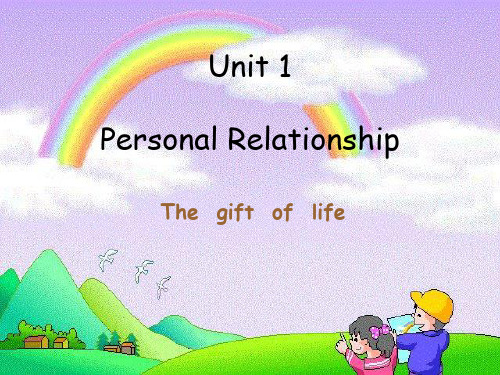
obviously obvious (a) e.g. It is obvious that even if we can save much energy, we can only delay the energy crisis. occasional (a) occasion e.g. A birthday is no occasion for tears.生日可不是哭鼻子的时候。 On another occasion, he landed in a deserted car park. 还有一次,他在一个废弃的停车场着陆。 orphan orphanage (n.) 孤儿院, 孤儿身份 e.g. Orphan Olive pat (pet) e.g. a pat on the cheek 在面颊上的轻轻一拍 plasma (n.) [解]血浆, 乳浆,[物]等离子体,等离子区 questioningly questioning (a/ n质问) questionless (adj.& adv.) 无疑的, 无疑地 question quest (v/ n) 寻求,搜寻 relief (n) relieve (v) e.g. I felt great relief when I heard I had passed the examination. 听说我已经通过了考试,感到轻松多了。 a drug that relieves headaches 缓解头痛的药
In most societies the highest form of love is that relationship between two individuals which is so strong that one will sacrifice his/her life for a loved one. "Greater love has no man than this, that he lay down his life for a friend." (from the Bible: Greater love hath no man than this, that a man lay down his life for his friend.)
新编大学英语第一册教案

Unit 1 Personal Relationships1. Preparation (Period 1& 2)Background InformationAll of us are involved in personal relationships. Some of these are related to family, some with fellow students or workers, and others of a variety of types. Most of these are happy, positive relationships, but not all of them. To have a positive relationship a person must invest time and interest in the other persons with whom he is associated. We all understand that our feelings and interest in other persons depend somewhat on what we have in common. Good relationships are usually valued because people who have good relationships are happier and more fun to be with.1.1 What kinds of relationship are you involved everyday?Can you complete the pairs of words about personal relationships?parent —host —husband —boyfriend —teacher —clerk —doctor —driver —employer —buyer —writer —performer —lawyer —director —policeman —interviewer —Eg: twins, family, couple, cousin, sisters, colleagues, leaders and audiencesisters and brothers, lovers, friends, neighbors, colleagues, schoolmates, fellow workers,…Are they important for your daily life or study? Why? List one example and explain it.1.2 Of all the relationships, which one do you think is easier to be established at the beginning of your college life? Why?A StoryListen to a short story and complete the following sentences:1. The story took place at the time of ______________________________________.2. The relationship between the woman and the little boy is _________.3. The woman led the little boy into the store because ______________________________.4. The woman bought the boy______________________________.5. ―Are you God…‖ here means ____________.原文:They came back outside into the street and the woman said to the child, ―Now you can go home and have a very happy holiday.‖ The little boy looked up at her and asked, ―Are you God, Ma’am?‖ She smiled down at him and replied, ―No, son, I’m just one of his children.‖ The little boy then said, ―I knew you had to be a relative of God.‖Welcome to Our Group!Introducing Yourself to Your Group Members Locationprovince 省 city 市county 县town 镇village 村in the suburbs of 在…的郊区high/middle school 中学key high school 重点中学high school attached to附属中学Personalityfrank 坦率的honest 诚实的outgoing 外向的shy 胆怯的introverted 内向的enthusiastic 热情的Hobbiesstamp-collecting 集邮 sports 运动reading 阅读watching TV 看电视 drawing 绘画photography 摄影 calligraphy 书法traveling 旅游shopping 购物surfing the net 网上冲浪playing cards 打牌fishing 钓鱼like 喜欢be keen on 喜爱prefer 比较喜欢favorite 最爱dislike 不喜欢Discussion in Pairs1. What is your viewpoint of the interpersonal relationships nowadays?2. If you were the woman, what would you do? Try to explain it.3. In our life, some people are open while some others are reserved. Which type do you prefer? Why?Listen to a passage and answer questions:acquaintance 熟人intimate 亲密的harmonious 和谐的t olerate 容忍Questions :1. According to the passage, what is the word ―friend‖?It covers a wide range of meanings as a classmate, a nodding acquaintance, a coworker, etc. 2. Why does everyone need friendship?We need help from, and also give help to, others.3. Why do modern people attach more importance to friendship?As life is full of difficulties and conflict, we need friends to support and help us and give us warnings against danger.原文We Need FriendsThe word, ―friend‖, covers a wide range of meanings. It can be a nodding acquaintance, a classmate, a partner, a playmate, or an intimate colleague. Everyone needs friendship. No one can sail the ocean of life single-handed. We need help from, and also give help to, others. In modern times, people attach more importance to relationships and connections. As life is full of difficulties and conflict, we need friends to support and help us. Our friends give us warnings against danger. Our friends offer us advice with regard to how to deal with various situations.Proverbs and SayingsA friend in need is a friend indeed.A friend is best found in adversity.患难见真情。
新编大学英语(第三版)1第一册 unit 1Read by critical thinking
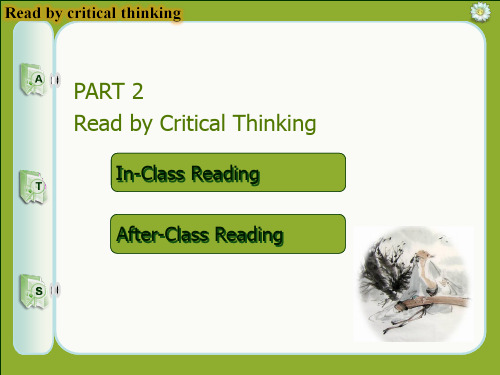
Global Reading
Questions for Group A and B
Step 2
Do you think the little boy's decision is acceptable to you? And why?
T
Regrouping
All the students are asked to answer with “Yes” or “No”. Then they are regrouped into Group C and D.
Global Reading
Questions for Group B
Step 1
1. What was the uninjured orphans' reaction to the doctors' request at the beginning?
T
2. How do you think of the little boy's decision? 3. How did the doctors feel about this boy?
注意: 1. be supposed to意思是:本来要,本应该 e.g. You’re not supposed to take the books out of the room. 这些书不能拿出这个房间。
T
2. land v. 意思是:落下,跌下,着陆 e.g. The ball landed in the pool.
句子分析
T
should have done表示本来应该做而没做, 而其否定式should not have done表示某种 行为不该发生却发生了。
Examples You should have thought about that before you invited her. (But the truth is that you did not think about that.) I shouldn’t have trusted that man. (But the truth is that I trusted the man.)
《新编大学英语》由浙江大学编著,应惠兰主编,外语教学与研究出版社出版第一册教案
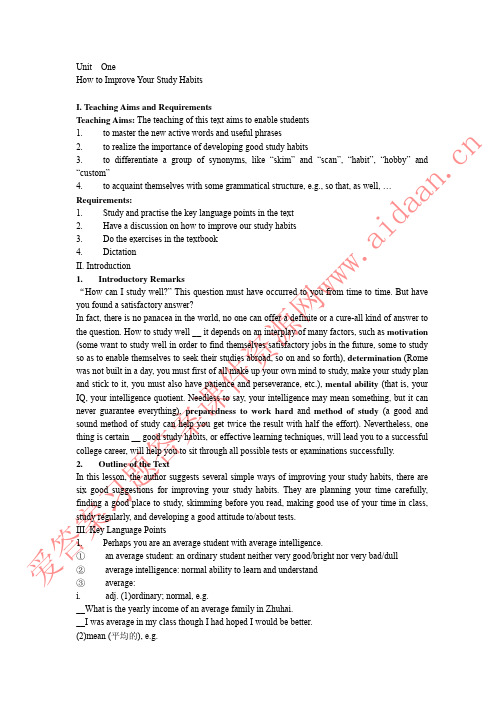
爱答案习题答案课件资源网w w w .a i d a a n .c nUnit OneHow to Improve Your Study HabitsI. Teaching Aims and RequirementsTeaching Aims: The teaching of this text aims to enable students 1. to master the new active words and useful phrases2. to realize the importance of developing good study habits3. to differentiate a group of synonyms, like “skim” and “scan”, “habit”, “hobby” and “custom”4. to acquaint themselves with some grammatical structure, e.g., so that, as well, … Requirements:1. Study and practise the key language points in the text2. Have a discussion on how to improve our study habits3. Do the exercises in the textbook4. Dictation II. Introduction1. Introductory Remarks“How can I study well?” This question must have occurred to you from time to time. But have you found a satisfactory answer?In fact, there is no panacea in the world, no one can offer a definite or a cure-all kind of answer to the question. How to study well __ it depends on an interplay of many factors, such as motivation (some want to study well in order to find themselves satisfactory jobs in the future, some to study so as to enable themselves to seek their studies abroad, so on and so forth), determination (Rome was not built in a day, you must first of all make up your own mind to study, make your study plan and stick to it, you must also have patience and perseverance, etc.), mental ability (that is, your IQ, your intelligence quotient. Needless to say, your intelligence may mean something, but it can never guarantee everything), preparedness to work hard and method of study (a good and sound method of study can help you get twice the result with half the effort). Nevertheless, one thing is certain __ good study habits, or effective learning techniques, will lead you to a successful college career, will help you to sit through all possible tests or examinations successfully. 2. Outline of the TextIn this lesson, the author suggests several simple ways of improving your study habits, there are six good suggestions for improving your study habits. They are planning your time carefully, finding a good place to study, skimming before you read, making good use of your time in class, study regularly, and developing a good attitude to/about tests. III. Key Language Points1. Perhaps you are an average student with average intelligence.① an average student: an ordinary student neither very good/bright nor very bad/dull ② average intelligence: normal ability to learn and understand ③ average:i. adj. (1)ordinary; normal, e.g.__What is the yearly income of an average family in Zhuhai.__I was average in my class though I had hoped I would be better. (2)mean (平均的), e.g.爱答案习题答案课件资源网w w w .a i d a a n .c n__What is the average yearly income of an ordinary family in Zhuhai? __The average age of the students in our class is 19.ii. n. 平均,平均数(often used in the set phrase, “on the/an average), e.g.__On the average, there are 550 Macao visitors going through Gongbei Customs a day. ④ intelligenceThe word “intelligence” may mean many things, the basic meaning is “the capacity to acquire and apply knowledge” A student with average intelligence is a student neither very bright nor very dull who does sufficiently well but wins no distinction. When we say a person is intelligent, we usually mean he or she studies and learns fast, or comes up with clever solutions to problems. e.g. intelligent quotient (IQ), an intelligent test2. This is not necessarily the case, however: But this might not be true sometimes. ① necessarily: as an inevitable result; unavoidably, inevitably, e.g. __Lung cancer is not necessarily associated with tobacco use. __Great books are not necessarily bestsellers. ② casei. the actual condition, e.g.__The majority led by Zhou, argued that this was the case.__That was not the case with the American women in our delegation.__With Internet we can communicate with people far away cheaply. But a few years ago that was not the case at all.ii. instance of a diseased condition, e.g. __Five cases of HIV have been confirmed. iii. question to be decided in a law court, e.g. __Police decided to look into the murder case.iv. Note that the word “case” is often used in some set phrases: in any case(无论如何), in no case (决不), in case (万一), in case of (如果发生), in the case of (就…而言, 至于) __I am ready to help in any case.__I couldn’t shelter behind him all the time, in any case, he wasn’t always with me. __He carries an umbrella with him in case it rains/it should rain. __In no case should we give in /lose heart.__In the case of my father, he doesn’t like fishing at all. __In case of the fire accident, please dial 119 immediately. 3. Then make a schedule or chart of your time. ① schedule (n., vt.)i. on schedule: on time (准时地,按时刻表),e.g.__Three days later, on schedule, I met with Sheldon in his office. ii. ahead of schedule: ahead of time, earlier, e.g. __We arrived at the destination ahead of schedule. iii. to schedule, according to schedule, e.g.__These operations have been successfully carried out according to schedule. ② chart, table, graphThe three words have the meaning of “图表”。
新编大学英语大学第一册教案
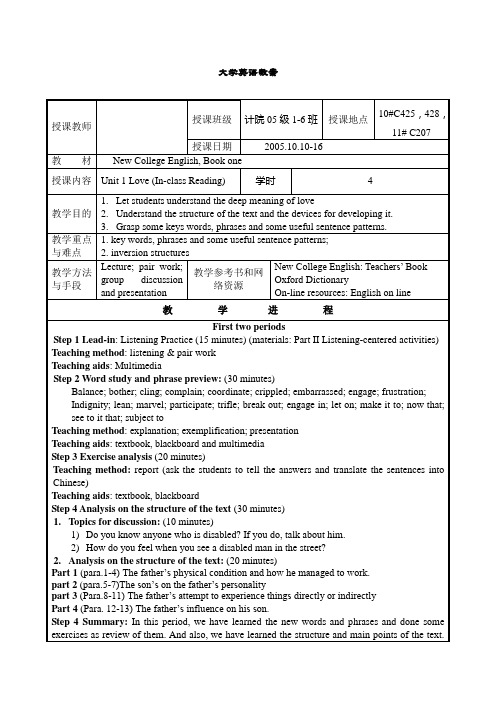
授课班级
计院 05 级 1-6 班
授课地点
10#C425,428, 11# C207
授课日期 2005.10.10-16 New College English, Book one Unit 1 Love (In-class Reading) 学时 4 1. Let students understand the deep meaning of love 2. Understand the structure of the text and the devices for developing it. 3. Grasp some keys words, phrases and some useful sentence patterns. 1. key words, phrases and some useful sentence patterns; 2. inversion structures Lecture; pair work; New College English: Teachers’ Book 教学参考书和网 group discussion Oxford Dictionary 络资源 and presentation On-line resources: English on line 教 学 进 程
Periods 3 and 4 Step 1 lead-in: listening practice (about 20 minutes) (material: CET band-4, listening part) Teaching method: listening & pair work Teaching aids: Multimedia Step 2: Analysis on the important language points. (30 minutes) 1. make it to the office 2. cling to 3. subject oneself to 4. now that… 5. inversion caused by “nor” 6. be engaged in 7. be content to do something 8. take a dive 9. see (to it) that… 10. “could/should/might/must have done” structure Step 3 Summarize the main idea of this text. (10 minutes) Teaching method: explanation; exemplification; presentation Teaching aids: textbook, blackboard and multimedia Step 4 analysis on quiz 1 (30 minutes) Teaching method: explanation; students’ report Teaching aids: Multimedia; textbook; blackboard Step 5 summary: In this period, we have first made some analyses on the text so that you can have a better understanding on the text and some useful expressions. And then we finished Quiz 1. In next period, we’ll first review what we learned, and then we’ll come to Unit 2.
全新版大学进阶英语1-unit-1-教案

课时: 2课时教学目标:1. 知识目标:- 学生能够理解并掌握关于梦想追求的词汇和短语,如pursuit of dreams, hard work, difficulties, achieve等。
- 学生能够识别并运用第一、二人称代词以及相关的连词和介词。
2. 技能目标:- 学生能够通过阅读、讨论和写作等活动,提高英语阅读理解和表达能力。
- 学生能够通过小组合作,提高听说能力和团队合作能力。
3. 情感目标:- 学生能够认识到追求梦想的重要性,并激发他们对未来的憧憬和信心。
- 学生能够学会尊重他人,理解不同文化背景下人们对梦想的追求。
教学重点:1. 理解并运用关于梦想追求的词汇和短语。
2. 提高阅读理解和表达能力。
3. 培养团队合作能力和英语听说能力。
教学难点:1. 理解并运用第一、二人称代词以及相关的连词和介词。
2. 通过小组合作,完成相关任务。
教学过程:第一课时一、导入1. 教师简要介绍本节课的主题:The Pursuit of Dreams(梦想的追求)。
2. 引导学生分享自己或他人的梦想故事。
二、阅读1. 学生阅读课文,了解文章大意。
2. 教师提问,检查学生对文章内容的理解。
三、词汇学习1. 教师讲解本节课的重点词汇和短语,如pursuit of dreams, hard work, difficulties, achieve等。
2. 学生跟读、模仿并运用所学词汇。
四、小组活动1. 将学生分成小组,每组讨论以下问题:- What is your dream?- How do you plan to achieve your dream?- What difficulties may you encounter in pursuing your dream?2. 每组选派一名代表分享讨论结果。
五、总结1. 教师对本节课的内容进行总结,强调追求梦想的重要性。
2. 布置课后作业。
第二课时一、复习1. 教师带领学生复习上一节课的重点词汇和短语。
新编大学英语第一册教案

课时安排:2课时教学目标:1. 培养学生的英语阅读能力,提高阅读速度和理解力。
2. 扩大学生词汇量,掌握基本语法知识。
3. 培养学生的英语口语表达能力和听力理解能力。
4. 增强学生的英语写作能力,提高书面表达能力。
教学内容:1. 单元主题:日常生活中的英语表达2. 课文:《日常生活中的英语表达》教学重点:1. 课文中的词汇和短语2. 课文中的语法知识3. 课文中的句型和结构4. 课文中的听力理解技巧教学难点:1. 词汇的记忆和运用2. 语法知识的理解和运用3. 听力理解的准确性教学准备:1. 课文教材2. 词汇卡片3. 语法讲解PPT4. 听力材料教学过程:第一课时:一、导入1. 利用图片或视频,展示与课文主题相关的日常生活场景,激发学生的兴趣。
2. 引导学生谈论自己在日常生活中遇到的英语表达,引出课文主题。
二、阅读1. 学生阅读课文,了解课文大意。
2. 教师讲解课文中的生词、短语和语法知识。
3. 学生跟读课文,模仿语音、语调。
三、讨论1. 教师提出与课文相关的问题,引导学生进行讨论。
2. 学生分组讨论,分享自己的观点和经验。
四、听力1. 学生听课文录音,回答相关问题。
2. 教师讲解听力技巧,提高学生的听力理解能力。
第二课时:一、复习1. 复习第一课时的内容,检查学生对课文的理解程度。
2. 学生互相提问,巩固所学知识。
二、口语1. 学生进行角色扮演,模拟课文中的场景,练习口语表达。
2. 教师给予指导和评价。
三、写作1. 学生根据课文主题,写一篇短文。
2. 教师讲解写作技巧,指导学生提高写作能力。
四、总结1. 教师总结本节课的主要内容,强调重点和难点。
2. 学生分享自己的学习心得。
教学评价:1. 学生在课堂上的参与度和表现。
2. 学生对课文内容的掌握程度。
3. 学生在口语和写作方面的进步。
教学反思:1. 根据学生的学习情况,调整教学内容和方法。
2. 关注学生的学习需求,提高教学效果。
新编大学核心英语教案
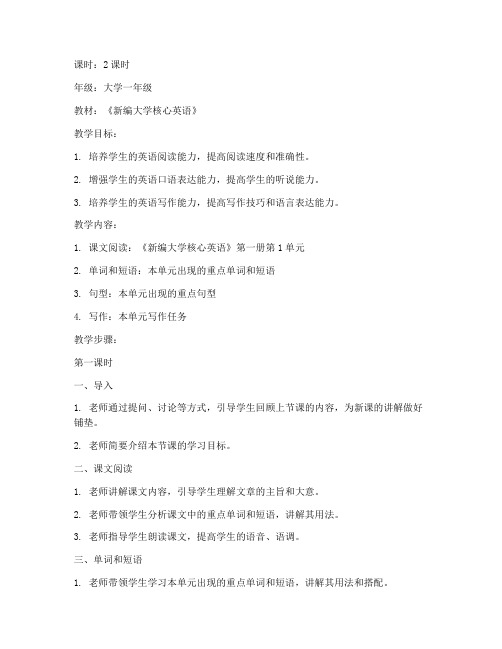
课时:2课时年级:大学一年级教材:《新编大学核心英语》教学目标:1. 培养学生的英语阅读能力,提高阅读速度和准确性。
2. 增强学生的英语口语表达能力,提高学生的听说能力。
3. 培养学生的英语写作能力,提高写作技巧和语言表达能力。
教学内容:1. 课文阅读:《新编大学核心英语》第一册第1单元2. 单词和短语:本单元出现的重点单词和短语3. 句型:本单元出现的重点句型4. 写作:本单元写作任务教学步骤:第一课时一、导入1. 老师通过提问、讨论等方式,引导学生回顾上节课的内容,为新课的讲解做好铺垫。
2. 老师简要介绍本节课的学习目标。
二、课文阅读1. 老师讲解课文内容,引导学生理解文章的主旨和大意。
2. 老师带领学生分析课文中的重点单词和短语,讲解其用法。
3. 老师指导学生朗读课文,提高学生的语音、语调。
三、单词和短语1. 老师带领学生学习本单元出现的重点单词和短语,讲解其用法和搭配。
2. 学生进行单词和短语的练习,巩固所学知识。
四、句型1. 老师讲解本单元出现的重点句型,分析其结构特点。
2. 学生进行句型练习,提高口语表达能力。
第二课时一、复习1. 老师带领学生复习上节课学习的单词、短语和句型。
2. 学生进行练习,巩固所学知识。
二、口语表达1. 老师引导学生进行口语练习,提高学生的听说能力。
2. 学生分组进行口语对话,模拟实际场景。
三、写作1. 老师讲解本单元的写作任务,分析写作要求和注意事项。
2. 学生进行写作练习,提高写作技巧。
四、课堂小结1. 老师对本节课的学习内容进行总结,强调重点。
2. 学生提出问题,老师解答。
教学评价:1. 课后作业完成情况2. 学生课堂参与度3. 学生口语、写作能力提升情况教学反思:1. 本节课的教学内容是否适合学生的实际水平?2. 教学方法是否有效,是否需要改进?3. 学生在学习过程中是否存在困难,如何解决?。
新编大学英语Book 1 unit 1

Unit One Love
Part I Preparation
Getting
to
know
each
other
Directions: work in groups and introduce yourself. Your introduction may include your name, home-town, high school, hobbies, etc. you might find the following phrases and expressions useful.
historical interest and scenic beauty. So I am very proud of my
hometown. I have a lot of hobbies, such as playing tennis, basketball and
listening to English songs. Before long, you’ll find that I am an
d. Don’t bother about/with it. e. Don’t bother to come to my home. n. 麻烦;焦虑 e.g. We had a lot of bother finding our way. 我们经过很 多麻烦才找到这里。
新编大学英语book1 unit1
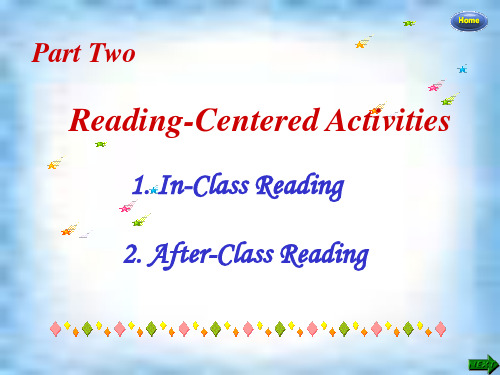
Part Two: In-Class Reading >> Global Reading
3. Questions and Answers
1) Who were the victims of the bombing? (Para.2) The missionary and the orphans (one or two were killed and several were wounded). 2) How badly was the young girl wounded? (Para.3) Without immediate action, she would die from loss of blood and shock.
Part Two: In-Class Reading >> Global Reading
2. Organization Analysis
Part III (Para.16-19) Main Idea: Significance
Para.16-19 Although Heng thought he was asked to give all his blood to the little girl, he is still willing to do it simply because she was his friend.
• At first most U.S. people supported the war, but opposition gradually increased, especially among college students and other young people as more U.S. soldiers were killed, and as the TV news showed terrible pictures of ordinary Vietnamese people being killed and injured.
新编大学英语第一册教案
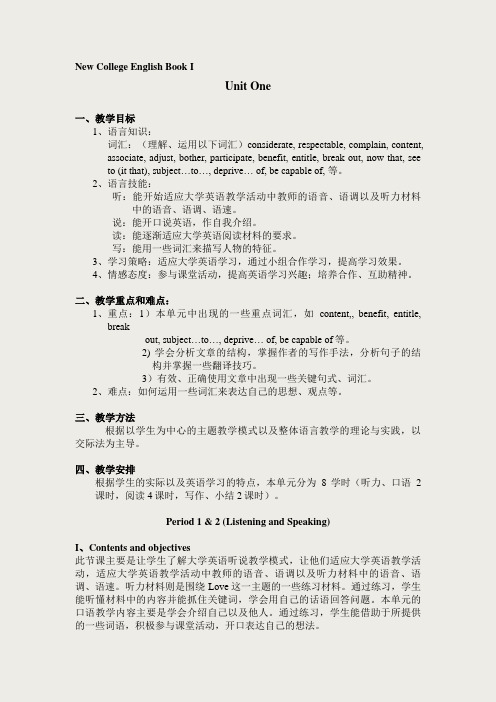
New College English Book IUnit One一、教学目标1、语言知识:词汇:(理解、运用以下词汇)considerate, respectable, complain, content, associate, adjust, bother, participate, benefit, entitle, break out, now that, see to (it that), subject…to…, deprive… of, be capable of, 等。
2、语言技能:听:能开始适应大学英语教学活动中教师的语音、语调以及听力材料中的语音、语调、语速。
说:能开口说英语,作自我介绍。
读:能逐渐适应大学英语阅读材料的要求。
写:能用一些词汇来描写人物的特征。
3、学习策略:适应大学英语学习,通过小组合作学习,提高学习效果。
4、情感态度:参与课堂活动,提高英语学习兴趣;培养合作、互助精神。
二、教学重点和难点:1、重点:1)本单元中出现的一些重点词汇,如content,, benefit, entitle,breakout, subject…to…, deprive… of, be capable of等。
2) 学会分析文章的结构,掌握作者的写作手法,分析句子的结构并掌握一些翻译技巧。
3)有效、正确使用文章中出现一些关键句式、词汇。
2、难点:如何运用一些词汇来表达自己的思想、观点等。
三、教学方法根据以学生为中心的主题教学模式以及整体语言教学的理论与实践,以交际法为主导。
四、教学安排根据学生的实际以及英语学习的特点,本单元分为8学时(听力、口语2课时,阅读4课时,写作、小结2课时)。
Period 1 & 2 (Listening and Speaking)I、Contents and objectives此节课主要是让学生了解大学英语听说教学模式,让他们适应大学英语教学活动,适应大学英语教学活动中教师的语音、语调以及听力材料中的语音、语调、语速。
[英语学习]新编大学英语电子教案
![[英语学习]新编大学英语电子教案](https://img.taocdn.com/s3/m/10565e36571252d380eb6294dd88d0d232d43c4d.png)
“[英语学习]新编大学英语电子教案”第一章:引言1.1 课程简介介绍新编大学英语电子教案的目的和结构。
强调英语学习的重要性和实用性。
1.2 教学目标提高学生的词汇量和语法水平。
培养学生的跨文化交际能力和思维方式。
1.3 教学方法采用任务型教学法,鼓励学生积极参与互动。
利用多媒体和网络资源,提供丰富的学习材料。
实施个性化学习,满足不同学生的需求。
第二章:语音和听力2.1 语音知识复习英语音标和发音规则。
练习单词的重音、语调和节奏。
2.2 听力训练练习不同口音和语速的英语听力材料。
提高学生对英语语音和语调的敏感度。
培养学生的听力技巧和策略。
2.3 语音和听力综合练习通过听力和语音练习,巩固所学知识。
练习语音和听力相关的实际场景对话。
第三章:词汇和语法3.1 词汇学习学习新词汇和短语,扩大学生的词汇量。
练习词汇的运用和搭配。
3.2 语法知识复习常用语法规则和句型结构。
练习语法知识在实际语境中的应用。
3.3 词汇和语法综合练习通过词汇和语法练习,巩固所学知识。
练习词汇和语法在实际场景中的应用。
第四章:阅读理解4.1 阅读技巧学习阅读理解的基本技巧和方法。
提高学生的阅读速度和理解能力。
4.2 文本分析分析不同类型和风格的英语文本。
练习理解和解读文本的主旨和细节信息。
4.3 阅读理解综合练习通过阅读理解练习,巩固所学知识。
练习阅读理解在实际场景中的应用。
第五章:写作和口语表达5.1 写作技巧学习写作的基本技巧和步骤。
提高学生的写作组织和表达能力。
5.2 口语表达技巧学习口语表达的基本技巧和策略。
提高学生的口语流利度和准确性。
5.3 写作和口语表达综合练习通过写作和口语表达练习,巩固所学知识。
练习写作和口语表达在实际场景中的应用。
第六章:语法进阶6.1 高级语法规则学习较为复杂的语法知识点,如倒装句、虚拟语气等。
掌握英语句子结构的多样性。
6.2 语法案例分析分析经典语法案例,加深对语法知识的理解。
通过语法案例,学会识别和纠正语法错误。
新编大学英语1电子教案
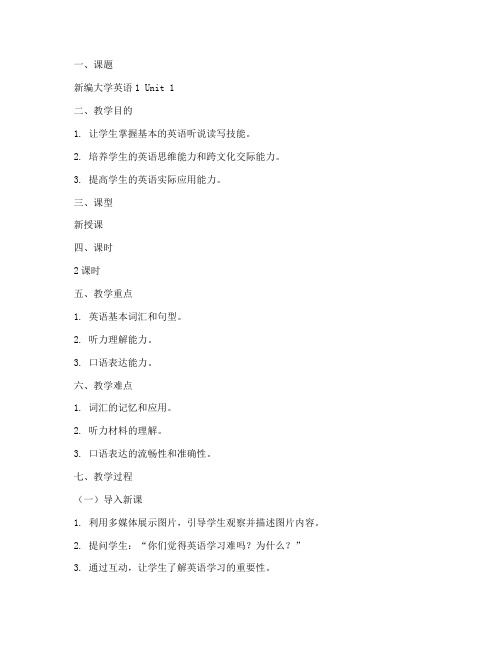
一、课题新编大学英语1 Unit 1二、教学目的1. 让学生掌握基本的英语听说读写技能。
2. 培养学生的英语思维能力和跨文化交际能力。
3. 提高学生的英语实际应用能力。
三、课型新授课四、课时2课时五、教学重点1. 英语基本词汇和句型。
2. 听力理解能力。
3. 口语表达能力。
六、教学难点1. 词汇的记忆和应用。
2. 听力材料的理解。
3. 口语表达的流畅性和准确性。
七、教学过程(一)导入新课1. 利用多媒体展示图片,引导学生观察并描述图片内容。
2. 提问学生:“你们觉得英语学习难吗?为什么?”3. 通过互动,让学生了解英语学习的重要性。
(二)讲授新课1. 词汇讲解:介绍本课重点词汇,并举例说明其用法。
2. 句型讲解:讲解本课重点句型,并进行示范。
3. 听力训练:播放听力材料,引导学生听并回答问题。
4. 口语练习:让学生分组进行口语练习,巩固所学知识。
(三)巩固练习1. 词汇练习:让学生根据所学词汇,进行填空、选择题等练习。
2. 句型练习:让学生根据所学句型,进行造句练习。
3. 听力练习:播放听力材料,让学生回答问题。
4. 口语练习:让学生进行角色扮演,巩固所学知识。
(四)归纳小结1. 总结本课所学内容,强调重点词汇和句型。
2. 鼓励学生在课后进行复习,巩固所学知识。
(五)作业布置1. 复习本课所学词汇和句型。
2. 完成课后练习题。
3. 收集有关英语学习的资料,进行阅读。
八、板书设计1. 课题:新编大学英语1 Unit 12. 重点词汇:example, importance, difficulty, etc.3. 重点句型:What do you think...? Why do you think so...?4. 教学步骤:导入新课、讲授新课、巩固练习、归纳小结、作业布置九、教具1. 多媒体设备:电脑、投影仪、音响等。
2. 听力材料:录音带、MP3等。
3. 教学课件:PPT等。
通过以上教学过程,使学生掌握新编大学英语1 Unit 1的基本知识,提高英语听说读写能力,为后续课程的学习打下坚实基础。
新编英语教程Book1 Unit 1电子教案
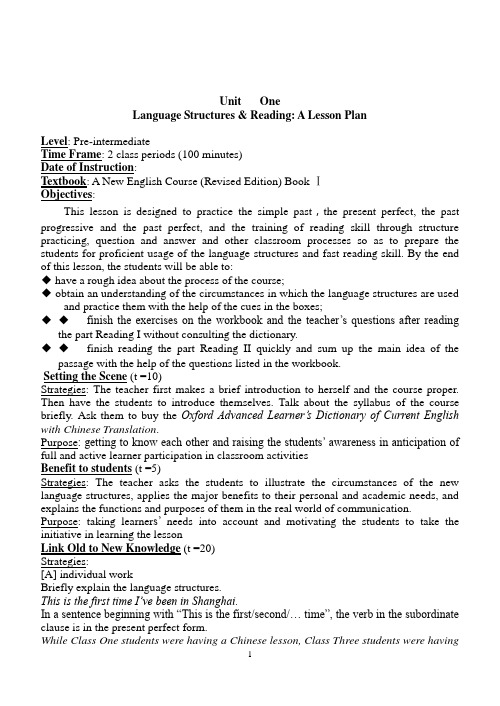
Unit OneLanguage Structures & Reading: A Lesson PlanLevel: Pre-intermediateTime Frame: 2 class periods (100 minutes)Date of Instruction:Textbook: A New English Course (Revised Edition) Book ⅠObjectives:This lesson is designed to practice the simple past,the present perfect, the past progressive and the past perfect, and the training of reading skill through structure practicing, question and answer and other classroom processes so as to prepare the students for proficient usage of the language structures and fast reading skill. By the end of this lesson, the students will be able to:◆ have a rough idea about the process of the course;◆ obtain an understanding of the circumstances in which the language structures are usedand practice them with the help of the cues in the boxes;◆◆finish the exercises on the workbook and the teacher‟s questions after readingthe part Reading I without consulting the dictionary.◆◆finish reading the part Reading II quickly and sum up the main idea of thepassage with the help of the questions listed in the workbook.Setting the Scene (t =10)Strategies: The teacher first makes a brief introduction to herself and the course proper. Then have the students to introduce themselves. Talk about the syllabus of the course briefly. Ask them to buy the Oxford Advanced Learner’s Dictionary of Current English with Chinese Translation.Purpose: getting to know each other and raising the students‟ awareness in anticipation of full and active learner participation in classroom activitiesBenefit to students (t =5)Strategies: The teacher asks the students to illustrate the circumstances of the new language structures, applies the major benefits to their personal and academic needs, and explains the functions and purposes of them in the real world of communication. Purpose: taking learner s‟needs into account and motivating the students to take the initiative in learning the lessonLink Old to New Knowledge (t =20)Strategies:[A] individual workBriefly explain the language structures.This is the first time I’ve been in Shanghai.In a sentence beginning with “This is the first/second/… time”, the verb in the subordinate clause is in the present perfect form.While Class One students were having a Chinese lesson, Class Three students were havinga lesson on the History of the Chinese Evolution.The past progressive tense is used here to express two actions going on at the same time in the past.By half past ten, we’d already had our English class.The past perfect tense is used here to express an action completed before a certain time in the past.Then read to the students the sample dialogues of Language Structure Practice Ⅰ, II, and III. Make sure that the students write them down correctly. Point out some new words in the boxes if necessary, for example, tournament, be on holiday, timetable.[B] pair workAsk the students to do the substitution practice on the book. Tell them to do practices of the basic structures with their partners with the help of the cues in the boxes. Changes can be made to make the short dialogues natural. Then check their dialogs in class. Purpose: activating the learners‟ prior knowledge of grammar and linking it to oral proficiency.Understanding New Knowledge (t =30)Strategies:[C] individual workPlay the recording of Reading I once or twice and ask the students to listen intently. Then ask a couple of simple questions to check their listening.e.g.Who is Herbert?Did the policemen believe what Herbert said at last?[D] individual workNow let the students read silently the passage Herbert’ Homecoming. Ask them to do the True or False questions on the WB. Then check answers with them and ask them why some of the statements are false. Other questions on this passage can also be asked, for instance,Why did Herbert come home earlier?What was he about to do when the policemen came?Did they ask Herbert questions as soon as they burst into the house?What did they take Herbert for? Why?Purpose: cultivating the ability of the students to grasp the main idea of a passage while listening and their reading comprehensionPresentation of New Knowledge (t =25)Strategies:[E] pair workAsk the students to read Reading II, A Sound Sleeper, silently in several minutes and try to answer the questions on page 3 on the WB. They can discuss with their partners their ideas. Then check answers with them.How long was Andrew going to be away from home?What did he do before he left home?What happened on his way?How did he get back home that evening?Why cou ldn’t he get into the house when he reached home?Why didn’t his wife wake up when Andrew pounded on the front door?What did he begin to do with his briefcase?Who came just then?Why had the neighbor telephoned the police?[F] group workAsk each group to discuss the main idea of Reading I and Reading II and to sum up the gist of the passages with the help of the questions.Point out some new words and phrases in the reading passages, such as burst open, sergeant, sandy-haired, shabby, peer at, spectacles, disappear, convince, burglar, a flat tire, thumb a ride, bolt, approach, keep an eye on, pound, sound sleeper, hurl, grab, jail, etc. Ask the students to look them up in their own dictionaries.Language points:● Herbert Marshall was a student at Cambridge, but his hometown was St. Albans. Cambridge: A municipal borough of east-central England on the Cam River north-northeast of London. It is an ancient market town and the site of Cambridge University, established in the 12th to 13th century. Population, 100,200St. Albans: a city about 22 miles north of London● … but he ran out of money, and came home a week earlier than he had expected to.run out of something: use something upe.g. run out of money/ time/ wineTime is running out for the contestant.May I have a cigarette? I seem to have run out.…he had expected to.e.g. You‟d better give a performance if you are asked to.I shall go if I want to.“Will you come to the party?” “I‟ll try to.”“Would you like to go to the movie with me tonight?” “Yes, I‟d love to.”● a small, sandy-haired man wearing a shabby, brown dressing-gownsandy-haired: pay attention to the formation of the word.Other examples:bad-tempered, kind-hearted, home-baked, medium-sized, leather-covered● He peered at Herbert intently through thick spectacles.peer atc.f. look at, stare at, gaze at, glare at, peer at, etc.Stare at—look at something directly and fixedly, often with wide-opened eyes.e.g. We stared at them in disbelief.Gaze at—look at something steadily with fixed attention. e.g. She gazed at thestars.Glare at—look at something angrilyPeer at—look at something closely or carefully, especially when you cannot see it clearly.● The policemen all looked dreadfully disappointed.He was feeling hot and sticky.look and feel + adjective: auxiliary wordse.g. look tired (surprised, depressed, sad, happy, excited)feel hungry (good, bad, hot, cold)● They were convinced they had caught a burglar.ConvinceV.to make somebody believe that something is true; to persuade somebody to do somethingconvince somebody of something/that …/to do…e.g. We couldn‟t convince him of his mistake.We couldn‟t convince him that he made a mistake.He was convinced that she was innocent.I tried to convince him to see the doctor.ConvincingAdj. that makes somebody believe that something is true 令人信服的,有说服力的e.g. a convincing explanation / argumentHis words sounded convincing to me.The Brazilians won convincingly.Purpose: restructuring given knowledge with new information to enhance the learners‟ cognitive awareness of the new language structures and expressions, and enhancing the fast reading skill of the students‟.Assignment (t =5)Strategies: The teacher gives a brief overview of the lesson today. Ask the students to preview Dialogue I. Ask the students to prepare for the retelling of Reading Ⅰ after class, and check it next class.Purpose: helping the students to get the main points of the lesson today and extending students‟ thinking by giving them assignmentsComment & Feedback (t =5)Strategies: The teacher checks the students for comments and feedback.Purpose: checking for understandingDialogues: A Lesson PlanLevel: Pre-intermediateTime Frame: 2 class periods (100 minutes)Date of Instruction:Textbook: A New English Course (Revised Edition) Book ⅠObjectives:This lesson is designed to practice the two dialogues fluently and the training of functional expressions of introductions through structure practicing, question and answer and other classroom processes so as to prepare the students for speaking proficiency. By the end of this lesson, the students will be able to:◆ understand the language points of the dialogues;◆ fluently speak out the useful expressions in Dialogue I and be able to recite the key partof the dialogue;◆◆make dialogues with the functional expressions in Dialogue II.Setting the Scene (t =10)Strategies: The teacher plays the recording of the first dialogue once or twice and asks the students to listen intently. Then ask them a few broad questions on it, such as,Where did A go during the summer? What for?What was the life in A’s summer camp like?What did B say about his experience in a summer camp?Purpose: raising the students‟ awareness in anticipation of full and active learner participation in classroom activitiesLink Old to New Knowledge (t =30)Strategies:[A] individual workExplain the language points and useful expressions of Dialogue I.● You know what? I‟ve just come back from a wonderful summer camp.Here you know what is used to express surprising news.e.g. You know what? I‟ve been accepted by that company!● I was greatly impressed by its natural beauty…be impressed bye.g. I was greatly impressed by my tutor‟s knowledge.This is the first time I have been in Weihai, and I was greatly impressed by itsnatural beauty.ImpressV. seal or press on somethinge.g. impress the cover of a book with patternsimpress patterns on the cover of a bookV. to have a great effect on something, especially somebody‟s minde.g. I was impressed by her prodigious talent.Amy impressed me favorably.ImpressiveAdj. making you feel admiration, because they are large, good, skilful, etc.e.g. You gave us an impressive show tonight.An impressive victoryTom was very impressive in the speech contest.ImpressionN. the effect that an experience or a person has on somebody or somethinge.g. Hard cleaning made no impression on the stain.N. an idea, a feeling or an opinion that you get about somebody or somethinge.g. What is your first impression of Weihai?I had the impression he was a policeman.He gave me the impression of a powerful leader.● It really is a very beautiful tourist attraction.AttractionN. a feeling of liking somebody or somethinge.g. the attraction of butterflies to flowersN. a feature, quality or person that makes something seem interesting and enjoyable e.g. Fancy toys have great attraction for children.City life has no attraction for Jimmy.It is the chief attraction of the program.Huangshan is one of the great tourist attractions of China.N. a force which pulls things towards each othere.g. The attraction of the moon for the earth causes the tides.magnetic attraction 磁力AttractiveAdj. pleasant to look at; having qualities that make something seem interesting and worth havinge.g. a large house with an attractive gardenan attractive smileThe movie is attractive to me.The commodity is attractive in price and quality.● I bet you had lots of fun there.I bet: I am certain, I am sure, or I understand what you are feeling 当然、肯定是这样You bet: used instead of …yes‟ to emphasize that somebody has guessed 那还用说e.g. “I nearly died when he told me the bad news.” “I bet!”“Are you nervous?” “You bet!”Have fun: have a good time, enjoy yourselfe.g. We had a lot of fun here in China.Sailing is good fun.I started to learn tennis just for fun.● … it brought back sweet memories…bring back… memoriese.g. The trip to Dalian really brought back the sweet memories of my university life.“Remember the trip we made to Shanghai?” “Yes, it brought back such wonderful memories.”The photos you sent me brought back lots of happy memories.Other examples:If memory serves me well 如果我没记错的话In memory of somebody: intend to show respect and remind people of somebodywho has diedMike founded the charity in memory of his late wife.● …not when we arrived at the foot of the mountain…not when (elliptical form in answering questions)e.g. “My mother never loses her temper.”“Never?”“Not when I don‟t do my homework on time.”● You remind me of my last trip there.Remind somebody about/of something: to help somebody remember something importante.g. It reminded me of the jokes he had told.“Don‟t forget the credit card.” “Remind me about it nearer the time.”Can someone remind me what I should do next?● I remember my summer camp was subdivided into what we called “hobby groups”…Pay attention to the prefix sub- here.Other examples:subdivide/ subway/ submarine/ suburban● You had a marvelous time this summer!marvelous: adj. extremely good, wonderfulOther examples:marvelous / great / wonderful / terrific / splendid / fabulous / fantastic[B] pair workPlay the tape again. Ask the students to read after the tape twice. Then have them in pairs to read the dialogue aloud. Check for correct pronunciation.Purpose: activating the learners‟ prior knowledge of grammar and linking it to oral proficiency.Understanding New Knowledge (t =20)Strategies:[C] individual workClose their textbooks and ask the students how to introduce themselves or others. Then let them look at the expressions listed on the book for a check. Have them read those expressions silently for a while.It’s Mr. Brown, isn’t it?My name is Lu Xin. I’m from Shandong University.Nice to meet you.How do you do?/ Hello./ Hi.May I introduce my brother Jack? / I’d like to introduce…/ This is …[D] group workAsk three students to perform Dialogue II as an example.Purpose: cultivating the ability of the students to understand the useful expressions and to be familiar with their functionsPresentation of New Knowledge (t =30)Strategies:[E] pair workAsk the students to make their own short dialogues with the help of the cues given on page 6. They are free to use the phrases and expressions listed on page 5. Changes can be made to make the short dialogues natural. Give them about ten minutes to practice.[F] pair workCheck the dialogues of the students in class. Ask if there are any volunteers. Ask several pairs to show their dialogues before the whole class.Purpose: restructuring given knowledge with new information to enhance the learners‟ cognitive awareness of the new functional expressions, and enhancing the students‟ speaking skill.Assignment (t =5)Strategies: The teacher gives a brief overview of the lesson today. Ask the students to preview Reading I and to prepare for the retelling of Dialogue Ⅰ after class, and check it next class.Purpose: helping the students to get the main points of the lesson today and extending student thinking by giving them assignmentsComment & Feedback (t =5)Strategies: The teacher checks the students for comments and feedback.Purpose: checking for understandingUnit OneGuided Writing & Comprehensive ExercisesLevel: Pre-intermediateTime Frame: 2 class periods (100 minutes)Date of Instruction:Textbook: A New English Course (Revised Edition) Book ⅠObjectives:This lesson is actually a review about this unit. It is designed to have the students do the exercises in the part of Guided Writing in order to prepare them for the training of more comprehensive writing skills, to do the comprehensive exercises in WB either independently or together with other students. By the end of this lesson, the students will be able to:◆ do the exercises in the part of Guided Writing in both SB and WB correctly;◆ finish the comprehensive exercises in WB and check answers with other students;◆◆Do the interaction activities in SB to make a review about the new words in thisunit.Setting the Scene (t =10)Strategies: The teacher makes a review about the lesson learned last time by checking thereciting of Dialog One or finishing doing the practice of different situations after Dialog Two.Purpose: raising awareness in anticipation of full and active learner participation in classroom activitiesBenefit to students (t =5)Strategies: The teacher does the first exercise in the part of Guided Writing in SB together with the students to ensure that they are clear about what to do today. Then tell the students to do the following exercises in the part of Guided Writing in order that they are aware of the gradation of proficiency between the exercises.The part of Note Writing is quite important. Talk about this part in detail.Introduce how to form a note of introduction: notes must be precise and to the point; the style is casual. In notes of introduction, the following are usually included:1. The name of the person to be introduced2. His /her identity3. Purpose of the introduction4. AppreciationA sample note:June 1, 1999 Dear Mr. Sullivan,This is to introduce Mr. Hu Ming. He is a linguistics student at our university. Mr. Hu is looking for a teaching assistant‟s post. Any assistance rendered him would highly appreciated. Thank you.Sincerely yours,Geoffrey Jackson Purpose: taking learner‟s proficiency into account and motivating the students to take the initiative in learning the lessonReviewing Old Knowledge (t =20)Strategies:[A] individual workPlay the recording of one part of the Dictation in WB. Ask the students to take the dictation to see if they have understood the passage and if they can write it down correctly. The passage is read four times. During the first time reading the students need to listen to the tape carefully for the understanding of the whole passage. During the second and third time reading they need to write down exactly what they hear from the tape. During the fourth time reading they have to check what they have written down.Collect the papers after the students have finished writing.Purpose: activating the learners‟ prior knowledge of vocabulary and language structures and linking it to new knowledge of writing and dictation skill trainingDoing Comprehensive Exercises (t =55)Strategies:Check the answers of the Comprehensive Exercises in WB one by one.[B] individual workPlay the recording of the Listening Comprehension, A Happy Coincidence, in WB. Ask the students to do the exercises while listening.At first, play the recording as a whole and then play it either sentence by sentence or paragraph by paragraph for better understanding. Finally play the recording as a whole once again.Then check the answers of multiple-choice and blank filling questions with the students.[C] group workTell the students to work in groups to complete such part of the comprehensive exercises as translation exercise. Have the students compare the translations of each member and choose the best one or the best part of everyone‟s version.[D] pair workAsk students in pairs to finish the following exercises, such as Blank Filling and V ocabulary Work in WB, and ask them to check the answers with each other. Then the teacher gives them the correct answers in class.[E] DiscussionOne member of each group reports to the whole class their best version of translation. The teacher holds discussions about these versions of translation, and chooses the best part of the versions or gives a referential version.Purpose: cultivating the ability of the students to do self-study and to cooperate to do tasks within a groupAssignment (t =5)Strategies: The teacher gives an overview of the interaction activity in SB to make sure that the students are clear about the requirements of the oral practice task. Talk with their partner and exchange information with him or her about what they had never seen before they came to this city. Ask them to talk about the topic after class in a natural way. Purpose: helping the students do oral practice more freely by using the new words Comment & Feedback (t =5)Strategies: The teacher checks the students for comments and feedback.Purpose: checking to see if the students have understood the usage of new words and finished the comprehensive exercises correctly。
unit_1新编大学英语book1
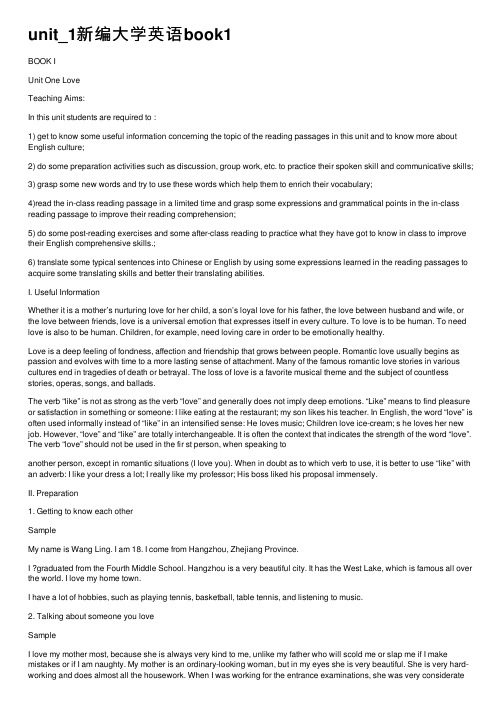
unit_1新编⼤学英语book1BOOK IUnit One LoveTeaching Aims:In this unit students are required to :1) get to know some useful information concerning the topic of the reading passages in this unit and to know more about English culture;2) do some preparation activities such as discussion, group work, etc. to practice their spoken skill and communicative skills;3) grasp some new words and try to use these words which help them to enrich their vocabulary;4)read the in-class reading passage in a limited time and grasp some expressions and grammatical points in the in-class reading passage to improve their reading comprehension;5) do some post-reading exercises and some after-class reading to practice what they have got to know in class to improve their English comprehensive skills.;6) translate some typical sentences into Chinese or English by using some expressions learned in the reading passages to acquire some translating skills and better their translating abilities.I. Useful InformationWhether it is a mother’s nurturing love for her child, a son’s loyal love for his father, the love between husband and wife, or the love between friends, love is a universal emotion that expresses itself in every culture. To love is to be human. To need love is also to be human. Children, for example, need loving care in order to be emotionally healthy.Love is a deep feeling of fondness, affection and friendship that grows between people. Romantic love usually begins as passion and evolves with time to a more lasting sense of attachment. Many of the famous romantic love stories in various cultures end in tragedies of death or betrayal. The loss of love is a favorite musical theme and the subject of countless stories, operas, songs, and ballads.The verb “like” is not as strong as the verb “love” and generally does not imply deep emotions. “Like” means to find pleasure or satisfaction in something or someone: I like eating at the restaurant; my son likes his teacher. In English, the word “love” is often used informally instead of “like” in an intensified sense: He loves music; Children love ice-cream; s he loves her new job. However, “love” and “like” are totally interchangeable. It is often the context that indicates the strength of the word “love”. The verb “love” should not be used in the fir st person, when speaking toanother person, except in romantic situations (I love you). When in doubt as to which verb to use, it is better to use “like” with an adverb: I like your dress a lot; I really like my professor; His boss liked his proposal immensely.II. Preparation1. Getting to know each otherSampleMy name is Wang Ling. I am 18. I come from Hangzhou, Zhejiang Province.I ?graduated from the Fourth Middle School. Hangzhou is a very beautiful city. It has the West Lake, which is famous all over the world. I love my home town.I have a lot of hobbies, such as playing tennis, basketball, table tennis, and listening to music.2. Talking about someone you loveSampleI love my mother most, because she is always very kind to me, unlike my father who will scold me or slap me if I make mistakes or if I am naughty. My mother is an ordinary-looking woman, but in my eyes she is very beautiful. She is very hard-working and does almost all the housework. When I was working for the entrance examinations, she was very considerateand never let me do any housework. When I was hungry at night, she would fix a snack for me. She is a good cook. It’s a pity that I am not able to have what she cooks because I am far away from home.III. Listening-Centered ActivitiesPlay the tape and make the students listen to the three listening exercises and answer all the questions on page 4、5、and 6. If necessary, play the tape once again.IV. In-Class ReadingA Good Heart to Lean On1. Pre-reading on p.9Directions: Discuss the following questions in pairs.1). How do you feel when you walk on the street and see a disabled person?I feel pity towards those who are disabled. I wonder how they can manage in their daily life and whether they have a job. I feel lucky that I am not disabled.2). Do you know anyone who is disabled? If you do, talk about him/her.Yes. My aunt is deaf and dumb. She has been like this since her childhood. My grandmother said that she became deaf because of taking the wrong medicine. She is now more than seventy years old and she has never been married. She was very kind to me. In fact it was she who brought me up. She often felt it unfair because she couldn’t hear. But she is very intelligent, and she is good at sewing. She sometimes kidded /teased me with gestures that she wanted to cut off her ears because they couldn’t work.2. Language Points:1).…I was embarrassed to be seen with my father.e.g. I was embarrassed/felt uncomfortable when the others saw me together withmy father”to be ashamed of : to feel shamefule.g: I am ashamed of what I have done.He was ashamed of having failed.to be ashamed to do sthe.g. I am ashamed to leave you this way.I am ashamed to have mentioned it; please forgive me.2). to let on: to let sb knowe.g. Don’t let on about the meeting.He doesn’t let on that he is richer than he really is.We didn’t let on about how rich we were.3). to set the pace:定速度,树⽴榜样e.g. Our store set the pace in book sales.John set a fast pace in walking.to keep pace with somebody:e.g. I can’t keep pace with your plan.Keep pace with times.4). to adjust to: to change slightly in order to be more suitable调整,校准,使适应e.g. to adjust to a new climateShe must to adjust herself to English life.The desks and seats can be adjusted to the height of any child.5). to make it (to): to arrive somewhere in time for sth; succeed ine.g. We are too late; I don’t think we’ll make it.You can make it if you hurry.After years as an unsuccessful businessman, he has finally made it.6). to pull through: to recover from illness恢复健康,度过难关e.g. They hoped that he would pull through.The doctor pulled her through.The economic situation was serious, but they pulled through.7). to marvel at: be greatly surprised ate.g. to marvel at her beauty/his skill/his tremendous achievements8). to subject …to: to make sb experience sth, especially sth unpleasante.g. He was subjected to severe criticism.He tries to subject the whole family to his will.to be subject to: to obey ; to abide by(adj.)受…约束⼒e.g. We are all subject to the laws of the country.to be subject to: to tend to have; to be likely/apt to have容易受到e.g. He is subject to headache.All men are subject to death.Japan is subject to earthquake.9). now (that): because of the fact thate.g. Now(that) you are here, let’s begin.Now that you have come, you may as well stay.Now that you are well again, you can travel.10).to engage in: to take part in; to become involved in an activity从事,参与e.g. If you engage in the local politics, you can’t have much time for your family.I have no time to engage in gossip, so please don’t come to me with your rumors and complaints.to be engaged in: to be busy with sth; to be busy in doing sth从事,忙于e.g. It is a hard and long struggle we are engaged in.He was engaged in writing letters.11). to participate in: to take part in; to join into participate in the strike activities/the game/the discussion/the ware.g. I longed to have the opportunity of participating in the strike activities.Everyone can participate in this game.12). to break out: (of fire, disease, violence, war, fight…) start suddenly (only used inactive voice)e.g. A fire broke out during the midnight.The economic crisis broke out in the United States.13). in frustration(和表⽰情绪的名词连⽤)(the same kind of phrases: in relief , in surprise in astonishment , in horror , in fun , in anxiety , in fear, in amazement , in despair, in anger)14). on leave: absence with permissione.g. He went home on leave.We are on leave until December.To take one’s leave(formal):to say good-byee.g. He took his leave after thanking his host.15). to see to (it that): 确保;注意做到,务必要(注意:从句中不⽤进⾏时态和将来时)e.g. See to it that you don’t fall.See to it that you are here punctually tomorrow morning.16). to be gone: to be deade.g. Now that his wife is gone, he is all on his own.All is over. He is gone.3. Questions for discussion:Directions: Work in groups to discuss the following questions.1). What do you think makes a good heart?I think there are many things to make a good heart. They are: kindness to others, endurance, hard-work, never hurting others, being satisfied with life, patience, etc.. 2). What did you learn from this article about the relationship between the father and the son?The fathe r knew his disability stood in the way between him and his son. That’s why he said to his son:” You set the pace. I’ll adjust to you.” The son was young, so he was ashamed of his father because other people stared at them. But deep in their hearts they loved each other. The father was proud of his son, and the son learned a lot from his father.3). How and why does the son’s attitude change?The son realized that it was his father who taught him many things such as how to have a good heart. He knew that having a good heart was more important than having a good appearance. Especially after his father died, he felt it more intensely that it was his father who guided him in his life.4). If you were the son, how would you feel towards the father?If I were the son, I wouldn’t be embarrassed to be seen with him by others. I would be proud of my father no matter how he looked because it was he who gave me life and brought me up. His disability was not his own choice. He was disabled, which was hard enough for him. How could the others look down upon him, let alone his son.(let alone更不⽤说eg: The baby can’t walk, let alone run. He can’t speak his own native language well, let alone French.)V. Further Development1. Different kinds of lovePossible alternatives:1) Lo ving members of one’s family: parents, grandparents, brothers, sisters, husband, wife, children, grandchildren2) Loving one’s life, animals, nature, etc.2. Group discussionSample II agree with the students, because I have pets. I feel happy when I’m wi th pets. I myself have a pet cat. I like him very much, and I enjoy taking care of him. When I am unhappy or in low spirits, I stroke him, cuddle (hold sth lovingly and closely in the arms) him and then I feel much better. He is like one of my friends. In a sense he is better than a friend because he never argues with me and usually obeys me.Sample III don’t agree with this statement. I am afraid of animals, especially dogs. I don’t know why, but I have been afraid of dogs since my childhood. At the sight of dogs, I shiver, I don’t understand how I can lower my blood pressure by stroking or patting them. Onthe contrary, my blood pressure would rise because I am so nervous around a dog and sometimes I can’t help screaming. 3. Translation on p.14Translate the Chinese sentences into English, using the expressions in brackets.1)He walks slowly because of his bad leg.2)He came to the meeting despite his serious illness.3)He saw to it that the same mistake wouldn’t happen again.4)Now that they have got to know each other a little better, they get along just fine.5)Then I found myself surrounded by half a dozen boys.6)I send you my best wishes on this happy occasion.4. WritingTo give the student a clearer idea of how to organize their composition, the teacher may encourage the students to include the following in their writing:a description of the physical features(height, weight, etc.) of the father;characteristics of the fatherwhat the student thinks of the father;something that had happened between the father and the studentSample IMy FatherMy father , forty-six years old, is a peasant. He is very hard-working, because he has a big family to support. Perhaps it is because he is tired, he is a man of few words, and almost no smile appears on his face. Father has never bought any toys or candies for my younger brother and me, but I know he loves us. He is strict with us. He once said, “You should study hard so that you can serve the people better in the future.” My family was poor but father promised that he would pay for education of my brother and me even if he had to sell our house. We were deeply moved. We are determined to study hard to repay our father. I love and admire my father.Sample IIMy MotherMy mother, a middle-aged woman, has a kind of typical characteristic of oriental women. I will always be thankful for her love and I’ll love her forever. When I was a child, my mother took me to the kindergarten even when the weather was bad. When I was naughty and made mistakes, my mother never blamed me. Instead she often told me some enjoyable stories and from these I was able to know what I should do and what I shouldn’t do. When I went to school, my mother cared about not only my daily needs but also my studies. When I did poorly in school, she often encouraged me to try my best again. She said she had confidence in me and told me never to lose heart. I’ll remember her kindness and advice forever.5. Proverbs concerning love●True love never grows old.●True love is giving, not taking.●All true love is fou nded on esteem.●Love asks faith, and faith firmness.●Without respect, love cannot go far.●Love is the reward of love.●Love lives in cottages as well as in courts.(爱情不分贫贱与富贵。
- 1、下载文档前请自行甄别文档内容的完整性,平台不提供额外的编辑、内容补充、找答案等附加服务。
- 2、"仅部分预览"的文档,不可在线预览部分如存在完整性等问题,可反馈申请退款(可完整预览的文档不适用该条件!)。
- 3、如文档侵犯您的权益,请联系客服反馈,我们会尽快为您处理(人工客服工作时间:9:00-18:30)。
Unit 1 Book 1 Personal RelationshipsI. Background informationThe Vietnam WarThe Vietnam War (1954-1975) is a long civil war between South Vietnam and the Vietcong and North Vietnam, ending in Communist victory.The United States was fully involved in the Vietnam War, which had a deep and lasting effect on US society and on the way that Americans thought about their own country. Military failures and loss of public support eventually forced the government to bring US forces back from Vietnam in 1973. American people have very divided feelings about the war.Many Vietnam Veterans feel angry because they were made to fight, and because they were not praised for their courage when they came home, but were sometimes criticized by people who opposed the war.II. Preparation activities.Brainstorming : Tell the class any words you know to describe the qualities of a true friend.III. In-class readingA .Text structure1.context (para.1~2)When in Vietnam WarWhere in a small villageWho several children, including one young girlWhat Bombs landed in the orphanage and some children were wounded. 2. In time order, what happened next? (para.3~18)1) Medical help arrived and they found the young girl needed blood. (Para.3)2) Only several children had the correct blood type. (Para.4)3) Because of language barrier, they had difficulties in asking the children for blood. (Para.5)4) Heng was willing to give blood but he was always sobbing and then crying silently during the operation. (Para.6 ~ 13)5) Under the help of the Vietnamese nurse, the Americans knew the reason. Heng thought that he would die, but he still did it because she was his friend. (Para.14 ~ Para.18)3. meaning of the story (para.19)There is no love greater than this, that a person lay down his/her life for a friend.B .Sentence study and oral translation1.Nobody knows what these bombs were supposed to hit during the terrible Vietnam War, but they landed in a small orphanage run by a missionary group. (Line 1)在可怕的越南战争期间,谁也不知道这些炸弹要轰炸什么目标,而它们却落在了一所由传教士办的小孤honest helpful generous儿院内。
Every student is supposed to be in the classroom before 8 o’clock.所有学生8点以前应该到教室。
2. …it was clear that without immediate action, she would die from loss of blood and shock. (Line 9) 如果不能立即采取行动,显然她将因失血过多和休克而死亡。
此句型中clear 常可被其他形容词替换如:it is obvious that, it is true that, it is evident that等没有英语课,大学生活确实会轻松很多。
但是不学英语,你显然不能适应现代社会的需要。
It is true that w ithout English course, college life may become much easier. But it is obvious that you can’t keep pace with the modern society if you don’t study English. Using what little common language they could find, together with a lot of sign language, they tried to explain to the frightened children that unless they could give some blood to their little friend she would certainly die. (Line 16)医生和护士用少得可怜的一点共同语言,结合大量的手势语,努力向这些受惊吓的孩子们解释说,除非他们能输一些血给自己的小伙伴,否则她将必死无疑。
1. Using + 宾语从句在句中作状语2. together with 相当于as well as,与前面短语一起作状语3. they tried to explain… 是句子的主语和谓语部分4. the frightened children 是句子的一个宾语(间接宾语)5. unless they could give… 既是句子的直接宾语又是后面句子的条件从句4. Heng was quickly laid on a bed, his arm cleaned with alcohol, and the needle inserted into his arm. (Line 27)此句中his arm cleaned with alcohol 和the needle inserted into his arm是独立主格结构。
独立主格结构在句中作状语,有自己的逻辑主语, 表示一种伴随的动作或情况。
◊ She lay on her back, her hands crossed under the head.她脸朝天头枕着交叉的手躺着。
(伴随状语)◊ Mother being ill, she has to take care of the family.妈妈病了,她得承担起照顾全家的责任。
(原因状语)◊ The clock having struck, we had to go to work.钟已敲过,我们不得不去工作了。
(时间状语)◊He has been working very hard, his first novel to be published soon他工作一直很努力,第一部小说即将发表。
(结果状语)◊There are four factories in this region, each having 200 workers这个地区有四个工厂,每个有200名工人。
(同位语)5. The medical team now was very worried because the needle should not have been hurting their tiny patient. (Line 42) 现在医疗小组非常担忧,因为针不该使他们的小病人一直感到疼痛。
should + have + 过去分词这一结构的肯定形式表示本应该做却没有做;其否定形式表示某种行为不该发生却发生了。
◊She shouldn’t have left the hospital so soon, for she had not yet recovered.她不该那么早就出院,因为她还没有康复。
◊You should have got Mark A in your final examination but your handwriting is too bad.你本可以在期末考试中得A,但是你的字写得太糟。
C.Words and phrases1. suffer (Line 5): feel or have pain, loss , etc.vt. 忍受,容忍,承受,耐住If you break the law, you must be prepared to suffer the consequences. 你如果违犯法律,就必须准备承担后果。
That young man had to suffer the injuries caused by the chemical weapons left by Japanese troops in World War II.那个年轻人不得不去承受日军在二战期间遗留的化学武器给他造成的伤害。
